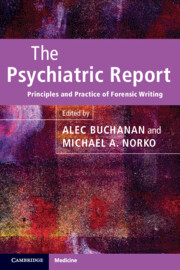Book contents
- The Psychiatric Report
- The Psychiatric Report
- Copyright page
- Dedication
- Contents
- Contributors
- Foreword
- Editors’ preface
- Introduction
- Section 1 Principles of writing
- 1 History and function of the psychiatric report
- 2 Preparation
- 3 Confidentiality and record keeping
- 4 Ethics
- 5 Writing a narrative
- 6 Draftsmanship
- Section 2 Structure and content
- Section 3 Special issues
- Index
4 - Ethics
from Section 1 - Principles of writing
Published online by Cambridge University Press: 07 September 2011
- The Psychiatric Report
- The Psychiatric Report
- Copyright page
- Dedication
- Contents
- Contributors
- Foreword
- Editors’ preface
- Introduction
- Section 1 Principles of writing
- 1 History and function of the psychiatric report
- 2 Preparation
- 3 Confidentiality and record keeping
- 4 Ethics
- 5 Writing a narrative
- 6 Draftsmanship
- Section 2 Structure and content
- Section 3 Special issues
- Index
Summary
- Type
- Chapter
- Information
- The Psychiatric ReportPrinciples and Practice of Forensic Writing, pp. 56 - 67Publisher: Cambridge University PressPrint publication year: 2011
- 1
- Cited by



